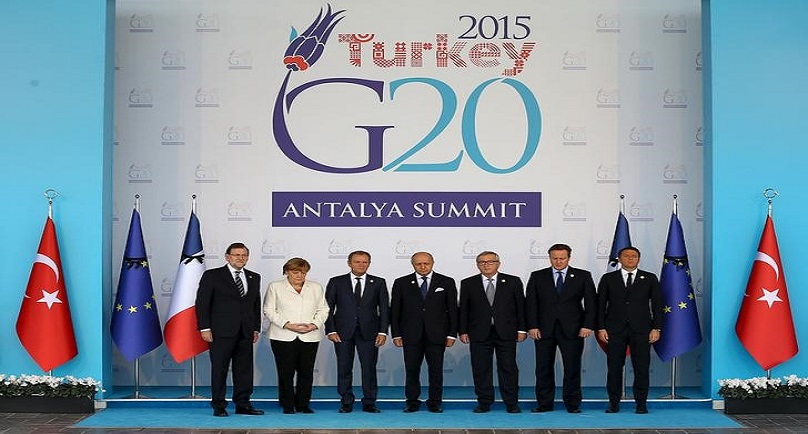Image: European Union leaders observe a minute of silence in memory of the victims of Paris attacks, at the Group of 20 (G20) leaders summit in the Mediterranean resort city of Antalya, Turkey, November 16, 2015. REUTERS/Volkan Furuncu/Pool
By Dasha Afanasieva, Jan Strupczewski and Humeyra Pamuk
BELEK, Turkey (Reuters) – World leaders vowed tighter border controls, more intelligence sharing and a crackdown on terrorist financing after the Paris attacks, but there was little sign at a summit on Monday of a dramatic shift in strategy against Islamic State in Syria.
U.S. President Barack Obama, speaking at the end of the G20 meetings in Turkey, said the coordinated attacks in the French capital were a setback in the fight against the jihadists, but that putting U.S. troops on the ground in Syria to combat them “would be a mistake.”
The attacks across Paris, which killed 129 people at a concert, restaurants and a football stadium on Friday, underlined the threat posed by Islamic State (ISIL) far beyond its strongholds in Syria and Iraq. They overshadowed the two-day summit, which took place just 500 km (310 miles) from Syria.
“ISIL is the face of evil,” Obama told a news conference, describing the attacks as a “terrible and sickening” setback but adding that progress against the group was being made.
“Tragically, Paris is not alone. We’ve seen outrageous attacks by ISIL in Beirut, last month in Ankara, routinely in Iraq. Here at the G20, our nations have sent an unmistakable message, that we are united against this threat,” he said.
Concerned about the “acute and growing flow of foreign terrorist fighters”, G20 leaders agreed to step up border controls and aviation security, in a joint statement that marked a rare departure from their usual focus on the global economy.
They condemned the Paris attacks as “heinous” and said they remained committed to tackling terrorist financing.
“This is the first time the G20 has actually gone into this sort of detail … There was a real sense of solidarity between everyone present,” French Foreign Minister Laurent Fabius said.
French warplanes pounded positions held by Islamic State in Syria on Sunday in what Fabius described as self-defence, while Obama said the U.S.-led coalition was accelerating efforts to find partners in the fight on the ground.
Prime Minister David Cameron said he wanted Britain to also carry out air strikes in Syria but still needed to convince more lawmakers to back such action, while German Chancellor Angela Merkel said the fight against terrorism could not be won by military force alone.
U.S.-led efforts to fight Islamic State were complicated when Russia joined the conflict a month and a half ago, targeting what the West says are mainly foreign-backed fighters battling President Bashar al-Assad, Moscow’s ally, rather than focussing on Islamic State.
Obama met Russian President Vladimir Putin in an informal meeting lasting around 30 minutes at the summit on Sunday, a discussion which Kremlin spokesman Dmitry Peskov said had been constructive but not groundbreaking. Obama made no mention of their meeting at his news conference.
The dilemma for Obama remained how to rally the coalition against Islamic State without drawing the United States deeper into Syria’s war, U.S. officials said.
European allies expressed full support, in a meeting with Obama, for a nationwide ceasefire in Syria in parallel with a planned political transition drawn up by foreign ministers in Vienna on Saturday and meant to lead to elections in Syria within two years, a White House official said.
Turkish Foreign Minister Feridun Sinirlioglu said the possibility of a military ground operation in Syria had not been discussed at the summit.
MIGRATION A GLOBAL CONCERN
Syria’s war has also spawned Europe’s largest migration flows since World War Two, and global leaders pledged to work to resolve a crisis that has seen millions of people displaced.
In a diplomatic coup for host Turkey and Europe, the G20 recognised the crisis as a “global concern” with major political and economic consequences, despite opposition from Russia,
China and some others who saw it primarily as a European problem.
Turkish President Tayyip Erdogan warned against conflating the migration crisis with the threat from global terrorism, saying to do so would be to shirk a humanitarian responsibility.
“Terrorism has no religion, ethnicity, nationality or region,” he said, adding that Turkey would pursue its battle against Kurdish militants, Islamic State, radical leftists, and other threats with equal determination.
Turkey has come under pressure from Western allies to ramp up its fight against Islamic State and tighten control of its 900 km (560-mile) border with Syria, which the jihadists have used to bring in supplies and foreign fighters. It is also under pressure from Europe to stem the flow of refugees.
But the NATO member has long complained about a lack of robust intelligence sharing and urged the West to provide more information about potential suspects before they travel.
A senior Turkish official said Ankara had twice notified France about one of the Paris attackers but had only received a request for more information after the attacks.
Ismael Omar Mostefai, 29, from Chartres, southwest of Paris, is the only attacker to have formally been named by police in France. He was identified by the print from one of his fingers that was severed when his suicide vest exploded.
Populist leaders around Europe rushed to demand an end to an influx of refugees and migrants from the Middle East and Africa in the hours after the Paris attacks.
“I was surprised how determined the leaders were not to confuse refugees with terrorists,” one senior EU official said, noting the statement had already been in the works after twin suicide bombings in October in host Turkey’s capital Ankara.
“What happened in Paris only strengthened the language.”
(Additional reporting by Matt Spetalnick, Kylie MacLellan, Lidia Kelly, David Dolan, Gernot Heller, Orhan Coskun and Asli Kandemir; Writing by Nick Tattersall; Editing by Mark Trevelyan)
Copyright 2015 Thomson Reuters. Click for Restrictions.


